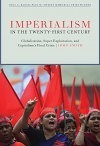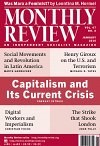Political Economy
As a concept, worker precariousness is far from new. It has a long history in socialist thought, where it was associated from the start with the concept of the reserve army of labor. Frederick Engels introduced the idea of precariousness in his treatment of the industrial reserve army in The Condition of the Working Class in England. Marx and Engels employed it in this same context in The Communist Manifesto, and it later became a key element in Marx’s analysis of the industrial reserve army in volume I of Capital.… In recent years, however, the notion of precariousness as a general condition of working-class life has been rediscovered. Yet the idea is commonly treated in the eclectic, reductionist, ahistorical fashion characteristic of today’s social sciences and humanities, disconnected from the larger theory of accumulation derived from Marx and the socialist tradition. The result is a set of scattered observations about what are seen as largely haphazard developments.… In the face of such a confusion of views—most of them merely ad hoc responses to what is presumed to be an isolated social problem—it is necessary to turn back to the classical Marxian tradition, where the issue of precariousness was first raised. | more…
From Public Service to Corporate Power
In the face of austerity cuts to state infrastructure provision, the British Broadcasting Corporation has recently generated something of a moral panic about the future of public sector broadcasting—mobilizing both its own news channel and its friends in the corporate media around the issue. Yet in the midst of this ongoing existential crisis, few have asked: What is it we are being asked to defend?… As in car manufacturing, what is provided is a limitedly resourced primary product, altered for different consumption demands, by add-on and take-off parts. | more…
Longtime
Monthly Review and Monthly Review Press author Richard Levins died on January 19, 2016, at the age of eighty-five. A polymath, he studied agriculture, mathematics, genetics, evolution, ecology, and philosophy.… He collaborated with Cuban scientists and served as a scientific advisor for Cuba. With his close friend and coauthor Richard Lewontin he wrote a column, “Eppur´ Si Muove,” for the journal
Capitalism, Nature, Socialism, and he actively participated in the progressive organization Science for the People, working to confront the misuse of science. He was, above all, a leading Marxist intellectual, ecologist, biomathematician, philosopher of science, and comrade.… Four months before his death, Levins submitted this essay to
Monthly Review. In it he discusses
La economía del conocimiento y el socialismo by Agustín Lage, published in 2013 by Editorial Academia del Hispanismo. The book is currently unavailable in English translation. In the pages that follow, we feature this last essay by Levins, under the circumstances substantially unedited, along with his classic article “Living the Eleventh Thesis,” an excerpt from
Biology Under the Influence that first appeared in the January 2008 issue of
Monthly Review.
—Brett Clark
In the United States today, the age of monopoly-finance capital and neoliberal politics, all aspects of social life are being financialized at breakneck speed, while the economy as a whole and employment remain lackluster. Financial flows of whatever kind are converted into “securitized” assets to be leveraged by Wall Street speculators. The data of private communications are mined. Health care is converted into a realm of super profits. Public water and electric facilities are sold to the highest bidder. The political system is turned into an open-air auction. Even pollution is treated as a market.… At the center of this juggernaut is elementary and secondary education, which receives over $550 billion in annual public spending, equal to the GDP of Belgium, ranked twenty-fifth worldwide in national income. The new copyrighted Common Core State Standards, and the accompanying standardized tests run by two multi-state consortia in conjunction with testing companies, are “high stakes” not merely for schools, teachers, and students, but also for the vested interests of capital. | more…
Big business has long been enamored of public education. Whether shaping systems of schooling along the lines of factory production, dictating what children should learn, or cultivating private-public partnerships to gain access to government monies, corporations and their owners have insisted on being key players in the formation of education policy and practice in the United States. Analysts estimate the value of the K-12 education market at more than $700 billion dollars. Beyond their calls for students and workers to adapt to the global capitalist economy through increased competition and “accountability” in public schools, business leaders crave access to a publicly funded, potentially lucrative market—one of the last strongholds of the commons to be penetrated by neoliberalism.… In an education industry dependent on market competition to increase profitability, there is no better tool to turn teaching and learning into products—ready to measure, compare, and sell—than the high-stakes standardized tests championed by the contemporary education reform movement. | more…

From mainstream news reports, one might easily conclude that the Paris climate agreement, presented to the world on December 12, 2015, was a complete triumph. The Guardian headlined it as “The World’s Greatest Diplomatic Success.” However, by any meaningful criteria, the Paris climate change agreement was fraudulent, based on a fabric of illusion. Moreover, the distorted media coverage of the climate deal, presenting it as a historical agreement virtually without shortcomings, was made possible in large part by the French government’s banning of the mass climate protests, following the November 2015 terrorist attacks in Paris. With radical protestors silenced and their demands marginalized, the global power elite could make virtually any public claims it wished, without acknowledging any other public voice or alternative view. | more…

Winner of the first Paul A. Baran–Paul M. Sweezy Memorial Award for an original monograph concerned with the political economy of imperialism, John Smith’s Imperialism in the Twenty-First Century is a seminal examination of the relationship between the core capitalist countries and the rest of the world in the age of neoliberal globalization. Deploying a sophisticated Marxist methodology, Smith begins by tracing the production of certain iconic commodities—the T-shirt, the cup of coffee, and the iPhone—and demonstrates how these generate enormous outflows of money from the countries of the Global South to transnational corporations headquartered in the core capitalist nations of the Global North. From there, Smith draws on his empirical findings to powerfully theorize the current shape of imperialism. | more…

Prabhat Patnaik’s Review of the Month in this issue addresses problems of economic stagnation and imperialism in the context of explaining the current global crisis. Patnaik is part of a broad tradition of Marxian thought and heterodox economic analysis more generally that has long focused on issues of economic stagnation under monopoly capitalism. Such questions are now finally being taken up even by orthodox economists, but in ways that systematically ignore decades of contributions in this regard made by heterodox theorists. Ever since Larry Summers raised the issue of secular stagnation (referring back to Alvin Hansen’s theory of the 1930s and ’40s) at an IMF meeting in 2013, the question of stagnation has become part of a worldwide economic debate, moving issues that were once on the margins to center stage. This has resulted in a proliferation of mainstream economic treatments of the history of the secular stagnation concept in the 1930–1950s period, after which mainstream economists had essentially declared the issue dead. | more…
The “thirty-year crisis” of capitalism, which encompassed two world wars and the Great Depression, was followed by a period that some economists call the Golden Age of capitalism. Today, however, capitalism is once again enmeshed in a crisis that portends far-reaching consequences. I am not referring here to the mere phenomenon of the generally slower average growth that has marked the system since the mid-1970s. Rather, I am talking specifically of the crisis that started with the collapse of the U.S. housing bubble in 2007-8 and which, far from abating, is only becoming more pronounced.… The Western media often give the impression that the capitalist world is slowly emerging from this crisis. Since the Eurozone continues to be mired in stagnation, this impression derives entirely from the experience of the United States, where there has been talk of raising the interest rate on the grounds that the crisis is over, and inflation is now the new threat.… To claim…that the United States is experiencing a full recovery is, in terms of working class well-being and economic security, wrong. And if we consider the rest of the world, especially recent developments in the “emerging economies,” the situation is much worse. | more…
A century has now passed since Lenin’s Imperialism, the Highest Stage of Capitalism (1916) and Bukharin’s Imperialism and World Economy (1915), as well as Rosa Luxemburg’s 1913 Accumulation of Capital, all spoke of imperialism as a force and tool of capitalism. It was a time of world war, monopolies, antitrust laws, strikes for pay raises, Ford’s development of the assembly line, the October Revolution, the Mexican Revolution, the failed German revolution, and much more. It was a time that saw the spread and deepening of global challenges to capitalism.… This article reviews the role of the international division of labor in classical Marxist concepts of imperialism, and extends these ideas to the international division of labor in the production of information and information technology today. I will argue that digital labor, as the newest frontier of capitalist innovation and exploitation, is central to the structures of contemporary imperialism.� | more…
Blessed were the times when a man’s decision about his fate lay in his own hands. Blessed were the times when he relied upon himself and was under no one’s direct command and formed his life through his direct relationship to nature. These were times of transparent clarity; these were times of child-like belief in God; these were times of inner peace. The environment [Umwelt] of the man of that time existed outside of his horizon; its events passed him by or broke into his life naturally, suddenly, overwhelmingly. Wars and starvation, epidemics and bad harvests stood on the same plane—they were to man equally strange, equally incomprehensible, equally remote.… This assault of his environment into his existence, these catastrophes which from time to time would bring his life into turmoil, man could not explain to himself. For they were of a different type than he was; for they were covered by a thick impenetrable shroud…. Faith replaced knowledge at that time; prayer replaced action, and fear replaced circumspection. | more…
Common Fonts of a Great Transition
To link Marxism and ecological transition may seem at first like trying to bridge two entirely different movements and discourses, each with its own history and logic: one having mainly to do with class relations, the other with the relation between humans and the environment. However, historically socialism has influenced the development of ecological thought and practice, while ecology has informed socialist thought and practice. Since the nineteenth century, the relationship between the two has been complex, interdependent, and dialectical.… This essay unearths the deep ecological roots of Marx’s thought, showing how he brought an environmental perspective to bear on the overarching question of social transformation. From there it traces the evolution of Marxian ecology, illuminating its profound, formative link to modern ecological economics and systems ecology. It concludes with the wider project of building the broad and deep social movement required to halt and reverse ecological and social destruction. | more…


